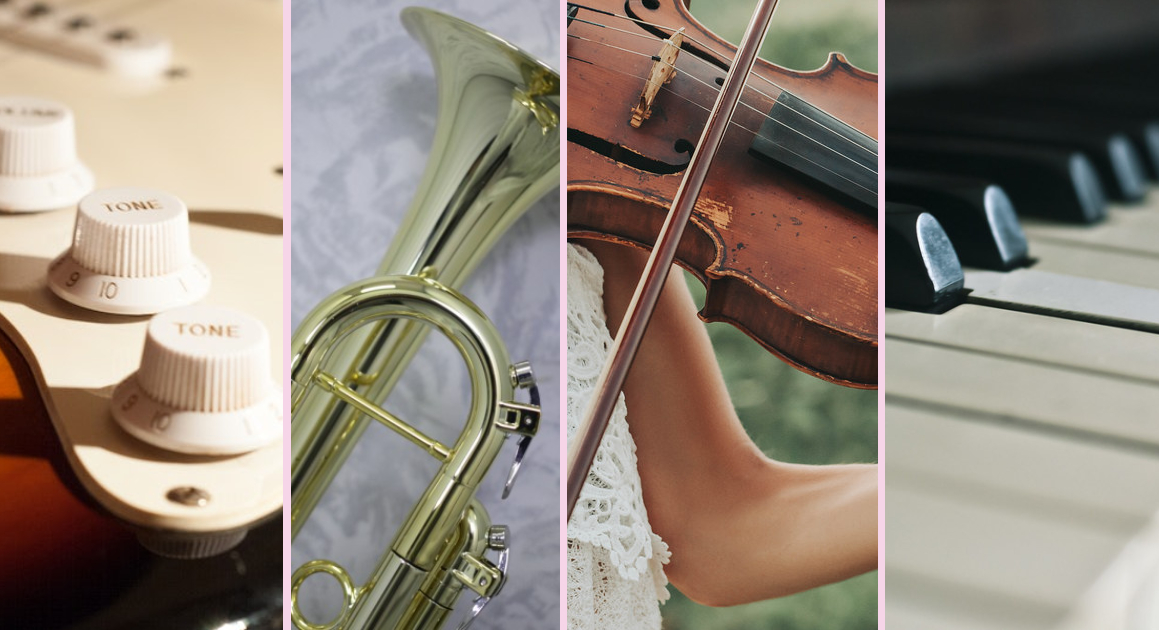
What exactly is the easiest instrument to learn to play? It’s a question that we get asked an awful lot by newcomers who are thinking about dipping their toes into musical waters for the first time.
Alas, as I’m sure you’ve probably already guessed, this is a question that doesn’t have a particularly straightforward answer. The most important thing to consider from the start is that the instrument you love is most likely to be the “easiest” to learn, simply because you’ll feel content practising with it and spending time mastering it. Time flies when you’re having fun, after all.
Still not satisfied? We didn’t think you would be. That’s why we’ve adapted our very own Chris Fower’s wonderful eBook on the easiest instruments to learn. In this article, we’ll explore all the major instrument groups, and do our very best to provide you with a critical assessment of which instruments really are easier to pick up and play.
We’ll cover:
- What exactly do we mean by “easy”?
- Classical strings
- Brass
- Electric guitar
- Classical guitar
- Bass guitar
- Keyboards
- Woodwind
- Percussion
- Drums
Before we move on, please try to remember that there really is no one-size-fits-all rule! This article is simply to try and give you the best information possible, after which you can decide which instruments are right for you. And of course, if you prefer, you can download out our free eBook here.
What exactly do we mean by an easy instrument to learn?
Good question! We’re so glad you asked.
In broad terms, we’re dividing difficulty into two key areas. The first - and this is something most beginners will want to know - is “What are the technical difficulties of operating the instrument?”
In other words, how easy is it to make a sound on the instrument? To learn the notes? To read the music?
The second area is “What role within an ensemble or genre the instrument plays?”
Do you want to be the star of the show, or would you rather hang back and provide a supporting role? If you’re looking to join a band or ensemble as soon as possible, considering an instrument with lower technical or musical demand could be the answer.
Now, this is absolutely not to suggest that instruments that are easier to pick up are somehow worth less, or less impressive in the grand scheme of things. We want to make that as clear as possible right now, okay? As Chris explains in his book, “Even instruments that present the humblest of technical challenges can hold the key to musical roles that are vital to the success of a performance.”
In other words, if you’re attempting to learn an instrument - no matter what instrument - you’re already brilliant, and we’re already very impressed with you. So let's read on!
Are classical strings easy to learn?

Classical strings are generally thought of as incredibly hard to play and are super expensive to buy. Maybe cross this group off your list if time and budget are an issue.
The classical string quartet also has its own internal hierarchy. Let’s try and break it down, shall we?
The musical roles of lead violin and principal cellist are widely considered to be about as prestigious as it gets. But that’s not to say the violist (widely considered something of an underdog) never gets time in the spotlight. The bass section also plays a vital role, beautifully underpinning and guiding the ensemble’s music.
The double bass is arguably the easiest to operate, but there’s no getting around the fact a full-size one is massive. You won’t have much fun lugging it across town on the bus, we’ll tell you that for free.
While the cello is smaller than the double bass, it’s still a beast. But, as we pointed out earlier, it’s up there alongside the violin as incredibly demanding to master. These are instruments that will take oceans of time and patience, so be prepared for that.
Being able to read music will also be essential (which honestly is kind of the case for most instruments in this article) but you’ll learn this as you go.
Our advice? Try and learn with a group. It’ll be much more fun, and you’ll be able to combine personal practice with group sessions to get the best advantage.
Are brass instruments easy to learn?
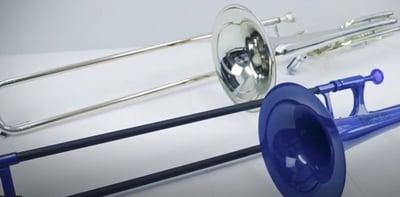
If you’ve paid any attention to what website you’re on, you’ll have gathered by now that brass is our specialist subject! We’ve previously discussed how long it takes to learn a brass instrument, but here we’re going to break down how easy (or indeed, hard) the specific instruments are.
French Horn
The French horn is the hardest instrument in this particular family. This is because the horn is very long, which puts the notes very close together. This means lips and breath need to be super accurate while playing!
Generally speaking, the horn also has the most limited set of genres and ensembles to play in but does feature in more orchestral music than any other brass instrument. And if cost is a factor for you, the horn is very much on the expensive side and usually requires one-to-one lessons to master.
The good news: many French horn players start on the infinitely more accessible Eb tenor horn.
Trumpet
Arguably the most popular brass instrument along with the cornet, the trumpet plays a dominant role in a whole host of ensembles and genres.
The trumpet is typically reserved for the big tunes and is often in the spotlight, so performing with one takes plenty of confidence and the ability to do well under pressure!
The trumpet is maybe the second hardest brass instrument to properly nail after the French horn. However, there are much easier and more cost-effective paths when it comes to trumpets, especially for younger players. The pBugle is a fantastic and affordable first trumpet, for example. Meanwhile, the pTrumpet and pCornet are robust and hassle-free beginner trumpets that offer a fun and engaging experience for slightly older kids
Trombone
Trombone is definitely more of a team game than the other brass instruments we’ve mentioned so far and tends to attract those who love the quality of sound as much as its musical content.
Like the trumpet, the trombone shows up in a wide range of ensembles and genres, meaning players have a wealth of variety to look forward to!
Despite appearing much more daunting on the face of it, the trombone is actually one of the easier brass instruments to get your first sounds on and start playing properly. The cost of suitable starter instruments for the trombone is also very low these days, and there are more online learning resources for the instrument than ever before. The pBuzz is a fantastic starter instrument for younger children looking to make their first sound, while the pBone Mini and pBone are great options for newcomers and students alike. You can also check out our own online learning resources for the trumpet and trombone.
Tuba
The tuba is the largest brass instrument and is most prevalent in brass bands. Being big and specialised, tubas are typically quite expensive. It’s also probably not the best choice if you are completely new to brass instruments, given its size, complexity, and the amount of air required from you to play it properly.
The good news is that on the whole, the brass band family of instruments are very accessible and the ability to transfer between instruments is pretty good. Try starting with a trombone or trumpet and see how you get on!
Is the electric guitar easy to Learn?
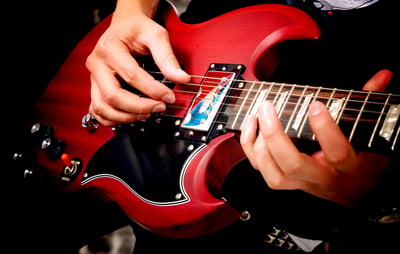
Who among us hasn’t been tempted to try and pick up the guitar at one point or another? Whether it’s Jimi Hendrix, Johnny Marr, Slash, or the Next Big Thing - I’m sure we’ve all watched our personal guitar heroes in awe and dreamed of tearing it up in front of thousands live on stage.
Despite appearances (and sound), the classic six-string electric guitar is actually a surprisingly sensitive instrument that takes delicate and subtle control to master. However, it’s arguably one of the easiest instruments to get an initial sound out of and start playing those first few simple songs.
The vast majority of guitar players typically learn songs by ear or rely on guitar tabs and YouTube lessons to pick up trickier pieces that they can then play from memory. Reading traditional music is, really, reserved for professional session-musicians here.
With mountains of online lessons and easy-to-read tabs readily available online, it’s genuinely easy to get started with the electric guitar. There are also plenty of low-cost amps and guitars online from retailers such as Gear4Music that make this one of the more affordable instruments out there.
One of the only downsides to note is that while you’ll likely be playing simple chords and power chords within a week or two, busting out face-melting solos like Eddie Munson in Stranger Things will take years of practice and dedication.
Is the classical guitar easy to learn?

While the nylon-stringed classical guitar shares some DNA with the electric guitar, it’s worth noting that classical is probably much harder to get a great sound from and really get a feel for.
The classical guitar is largely seen in ensembles and groups, but it’s also a great instrument to play solo. It sounds beautiful when played in isolation and will annoy the neighbours a lot less than if you turned on the amp and busted out ‘Smoke On The Water’ on your electric for the hundredth time that day.
Like the electric guitar, there are some solid low-cost options and heaps of online learning materials. However, the highest levels of classical guitar playing can get technically demanding very quickly.
Is the bass guitar easy to learn?
The bass guitar is probably the easiest in the guitar family to instantly pick up and play in terms of pure technical skills, but there are also so many incredible bass techniques that you can master!
The introduction of things like slap, p-bass, and fretless opened up a wide range of new possibilities, technical challenges, and sounds that make the bass a fascinating and versatile choice.
Perhaps one of the coolest things about bass playing is how fundamental it truly is to control the beat of a song and drive the sound. Make no mistake: without a bassist and drummer working in harmony, your band will almost certainly sound rubbish. Do not underestimate the bass!
Are keyboards easy to learn?
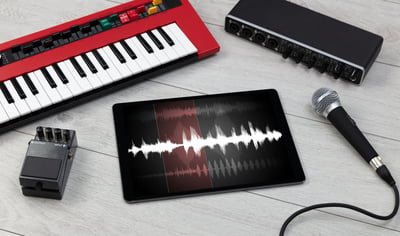
In terms of simple motor skills, there’s not much difference between this family of instruments, with one exception: The classic piano, which requires more feel and touch in the fingers, hands and arms to create the wide timbre set that a skilled player can use.
The rest of the keyboard instruments tend to require specific technical knowledge and often include tech that can aid the play with software-controlled accompaniment. Typically, this kind of tech makes electric keyboards a great place to start for beginners. It’s easy to make your first sounds, and many keyboards will have built-in guides to assist you with learning songs and chords.
Many of the skills learned on an electric keyboard could then be transferred to a more traditional piano, although as mentioned this is an instrument that comes with its own unique disciplines to master.
It’s also worth considering where you want to take your piano playing. Some are content learning one or two songs that can then be used to show off at parties, while others will want to pursue certain genres or styles. Whether you opt for jazz, classical, or even musical theatre, mastery takes time, patience, and practice.
Are woodwind instruments easy to learn?
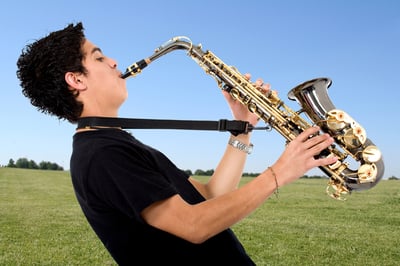
The recorder immediately takes the prize for the easiest woodwind instrument and is typically a great choice for any young kids looking for their very first steps into music. The skills learned on the recorder also help players to step up into more complex woodwind instruments, such as the saxophone.
Saxophone is similar to many brass instruments in that it requires an embouchure (lips controlling the sound and pitch), but is otherwise one of the easiest of its kind to get to grips with. However, it’s worth noting that the saxophone often plays a starring role in ensembles, and players will be able to demonstrate a mix of music reading proficiency and the confidence and talent to improvise (make it up as you go).
Saxophones are also quite expensive to buy and need annual maintenance, like all the woodwind family, so do consider that. If you’re still set, the most common place to start is the alto or tenor sax. You can also check out a beginner sax instrument like the Yamaha Venova.
Clarinet is a more affordable and transportable option but is arguably a step up in difficulty from the saxophone. The good news is that the clarinet is hugely popular in schools, and success can come quickly in terms of both being able to play tunes and join in ensembles.
Conversely, the flute can be a frustratingly difficult instrument to get into, depending on who you ask. Some are able to jump in and make music almost immediately, while others struggle to get a basic sound out of their flute for some time. Fortunately, once you’ve picked up the essential skills, progression can be both rapid and rewarding in terms of playing simpler songs. However, really mastering the instrument and getting to grips with its full scope and range can take years of practice. One-to-one lessons with a teacher are almost certainly best here.
The double reed instruments, oboe and bassoon are traditionally the hardest to get to grips with if you’re just starting out. The oboe plays a particularly prominent role, always asked to solo and play melodies in the orchestra or band. As such, it just about nabs the award for the most challenging woodwind instrument.
This, combined with much higher entry cost and the added expenses of reed purchases, instrument maintenance, and essential one-to-one lessons mean the oboe is not for the faint of heart. However, persevere and you will be rewarded, as good oboe and bassoon players are always in demand!
Are percussion instruments easy to learn?
Struggling to find the right instrument for you? Don’t beat yourself up. The fact is, percussion instruments are among the easiest to jump straight in and get started! You can be playing samba, djembe, taiko or gamelan after just one session of group training.
While this is usually just the first step in a lifetime of training, being able to dive right in from the off and have fun making music with a group makes percussion instruments amazingly rewarding.
You may be wondering why we’ve given drums their own section (up next) if we’re already talking about percussion. While there is plenty of crossover with drumming, the role of “percussionist” is basically playing all the things that are not the drum kit. Percussionists pride themselves in the breadth and depth of their knowledge and experience of a whole variety of instruments.
Exanples of percussion instruments:
- Timpani
- Side drums
- Cymbals
- Gongs
- Bells
- Triangles
- Tambourines
- Castanets
- Whistles
- Glockenspiel
- Vibraphone
- Marimba
- Xylophone
Obviously owning and learning all of the above would be a bit of an ask for a beginner. Most percussionists start their journey on the side or snare drum. Even a setup as simple as a pair of sticks and a practice pad could be a great starting point for your journey. Lessons are pretty important in beginning to really get to grips with it, but once you’re up and running? You’ll have a blast.
Are the drums easy to learn?
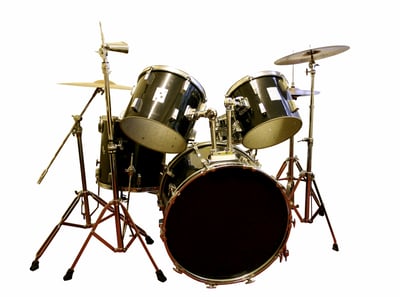
If you’re after a more traditional drum kit, you’ll need three things: a decent amount of money, lots of space, and very patient neighbours. There’s no getting around the fact that even the cheaper drum kits out there will still set you back a fair bit, and they’re not the easiest to set up and transport.
One very important thing to remember when buying drums is that you’re actually buying several drums, the hardware to support them, a set of cymbals, and a stool. It adds up!
The good news, of course, is that there are electronic kits that are great for learning on, easier to get to grips with, and mercifully much quieter since you can use headphones with them. There’s also a wealth of online learning materials out there to help you get to grips with the trickiest songs, although one-to-one lessons would probably be advised in the beginning.
So, should I learn an instrument?
Of course, you should! Learning to play an instrument - any instrument - is one of the best things a person can do. Making music, whether alone or with friends, is a joyous, transformative experience with heaps of proven benefits to your overall health and cognitive abilities. Hopefully, we’ve helped you narrow down which particular instrument you want to go for, but the crucial thing to remember is this: there are no wrong choices and limitless possibilities.
Whatever you decide, we hope you have a blast. And if you have any more questions? Don’t hesitate to get in touch with us. We’re here to help.
- Want more information on which brass instrument to choose? Read our blog article on choosing the easiest brass instrument to learn.
- The How to Play Trumpet page is a great introduction to learning to play the trumpet.
- pBuzz is the beginner learning tool. Our pBuzz starter guide gives you all you need to get buzzing.
After seven years writing about video games, Ewan made the jump to the music instrument industry to stop his family asking when he was going to get a real job. Mostly, though, he adores music and is passionate about its vital role throughout life - especially in education. He also played guitar in several bands with deeply embarrassing names that won't be revealed here. With a degree in journalism from an NCTJ-accredited university under his belt, Ewan uses everything he learned as a writer over the last decade to help answer any questions you might have about pBone Music in an accessible (and hopefully entertaining) way. Because if you can write 1,000 words on SSDs and ray-tracing, you can explain why plastic instruments are accessible, sustainable, and fun.